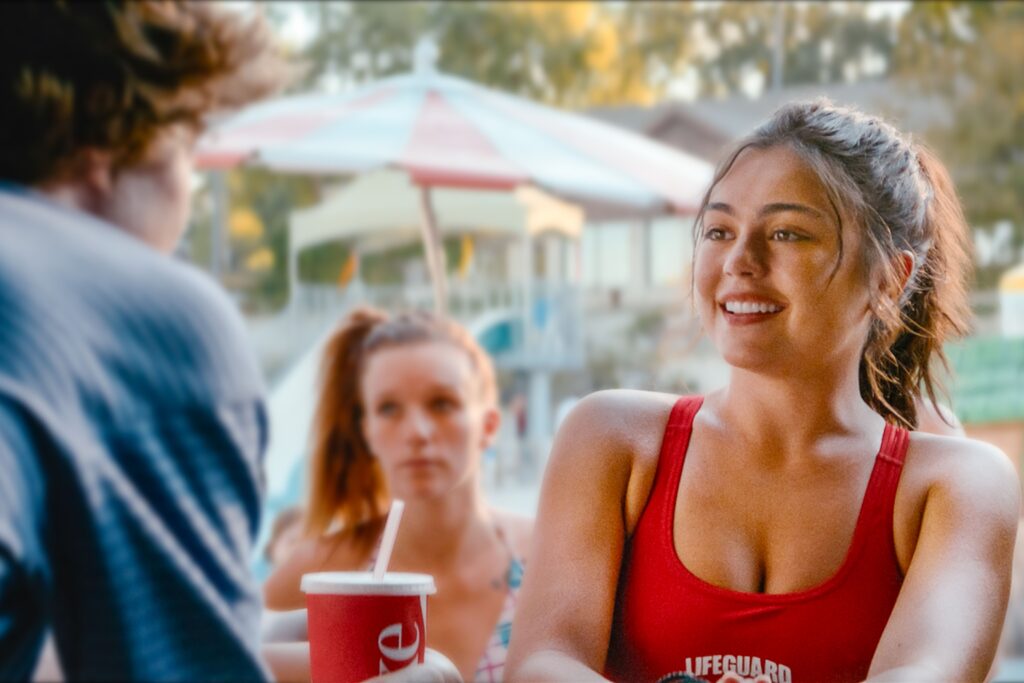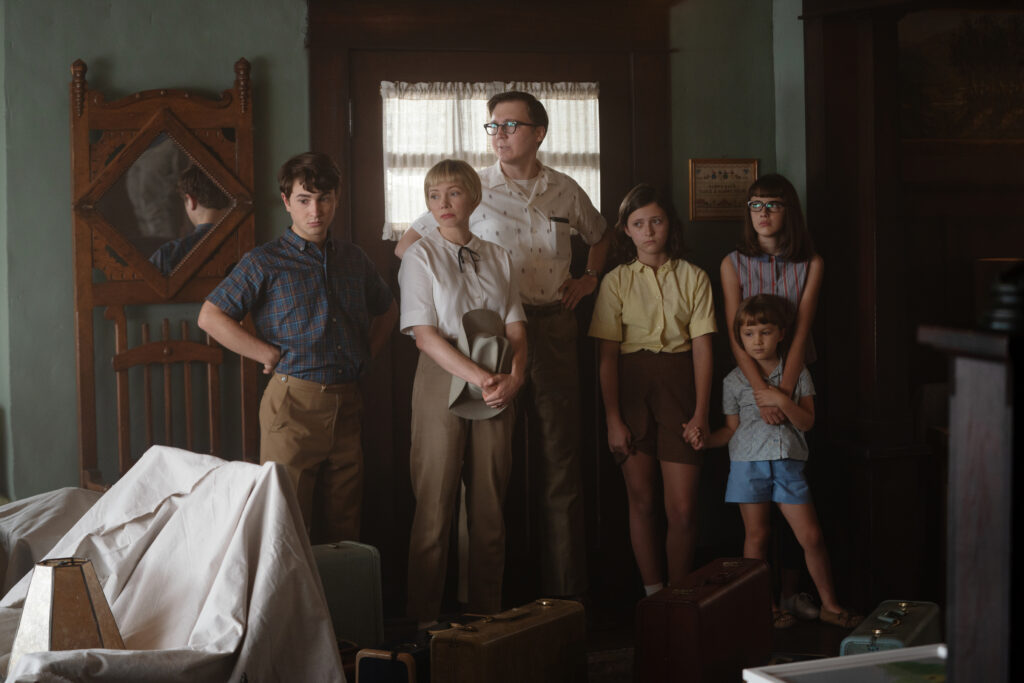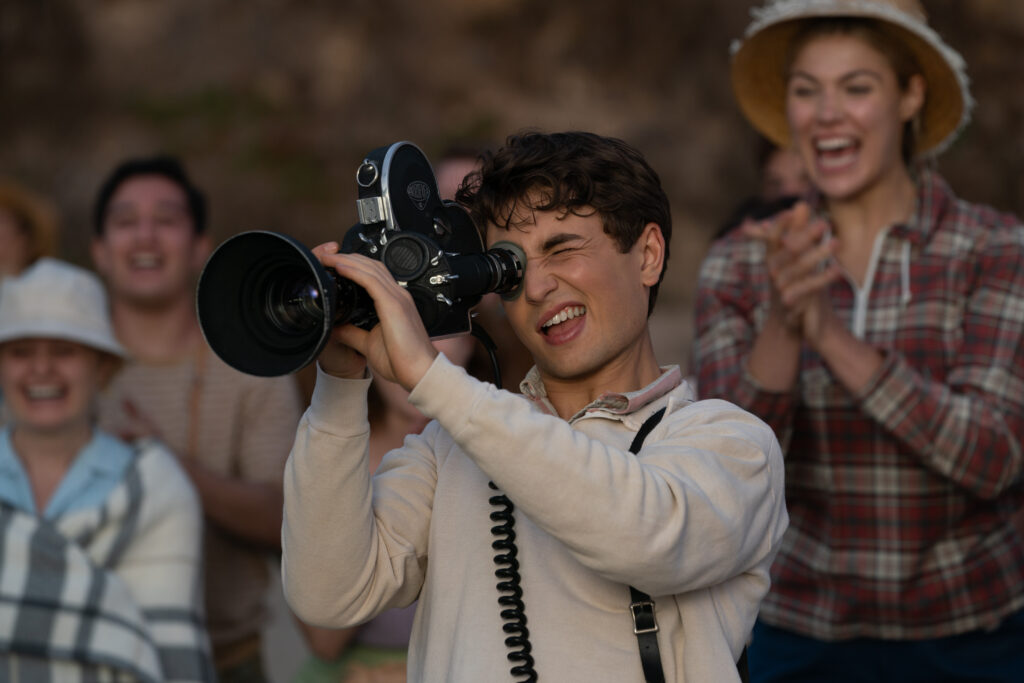March 7, 2024
by Carla Hay

Directed by Adam Rehmeier
Culture Representation: Taking place in Nebraska City, Nebraska (and briefly in Iowa), the comedy/drama film “Snack Shack” features a predominantly white cast of characters (with a few Latin people and African Americans) representing the working-class and middle-class.
Culture Clash: Two 14-year-old boys, who are best friends and who want to be “get rich quick” entrepreneurs, rent a concession stand at a public swimming pool for a summer, and they compete for the affections of a visiting teenage girl.
Culture Audience: “Snack Shack” will appeal primarily to people who are interested in watching teen movies set in the early 1990s and don’t mind if the movie can’t figure out what it wants to be in its very inconsistent storytelling.

Erratic and unfocused, “Snack Shack” is a silly comedy for the first two-thirds of the movie and then tosses in serious drama in the last third of this sloppily edited film. It’s a derivative teen buddy tale that makes all of the female characters annoying. The movie’s abrupt turn into tearjerking territory looks very out of place, because it’s an obvious and unearned attempt for “Snack Shack” to manipulate emotions out of viewers, before the movie shrugs it off and ends in a “business as usual” way.
Written and directed by Adam Rehmeier, “Snack Shack” takes place in 1991, and was filmed in Nebraska City, Nebraska, where the story occurs. Rehmeier says in the movie’s production notes that “Snack Shack” was inspired by memories of his own teen years in the 1990s in Nebraska City. Those memories seem to be very fragmented, based on the choppy narrative of this substandard movie. Scenes are built up with suspense and then abruptly cut away to the next scene. It happens enough times to be noticeable and aggravating.
“Snack Shack” begins by showing the two 14-year-old guys who are best friends and are at the center of the story. AJ Carter (played by Conor Sherry) is gangly, awkward and mild-mannered. Bruce “Moose” Miller (played by Gabriel LaBelle) is bossy, arrogant and short-tempered. Yes, it’s another buddy movie where the two best pals have opposite personalities. “Snack Shack” mostly takes place during the boys’ summer break from school.
Moose and AJ both have dreams of being business partners in a “get rich quick” scheme. The problem is that they haven’t figured out yet what type of business they should have to become wealthy. First, they travel to Iowa to go to an off-track betting parlor to try to make some cash. But someone who knows AJ’s parents sees Moose and AJ at the betting parlor, and reports it to AJ parents. AJ had lied to his parents by saying that he and Moose were on a field trip.
When AJ and Moose go back to AJ’s house, AJ’s parents yell at them about crossing state lines to gamble, and then they tell AJ that he’s grounded. AJ’s mother Jean (played by Gillian Vigman) is overprotective, but she’s depicted as an irritating nag who’s ready to punish without trying to find out the real reason for a child’s discontent. AJ’s equally strict and rigid father (played by David Costabile) is a county district court judge. His first name is never mentioned in the movie; he’s just called Judge by AJ and other people.
AJ has a sister named Chrissy (played by June Scarlett Gentry, also known as June Gentry), who is about 12 or 13. Chrissy is so one-dimensional, her only purpose in the movie is to tattle on AJ to get him in trouble, and then gloat when he does get in trouble. If Moose has any siblings, they’re not seen or mentioned in the movie. The only glimpse into Moose’s family life is a brief scene of Moose’s mother Sherry (played by Kate Robertson Pryor) encountering AJ’s mother Jean in a grocery store while AJ and Moose are with their respective mothers.
AJ and Moose are friendly with a man in his late 20s named Shane (played by Nick Robinson), who gives them rides in his truck and encourages them to rebel. There’s a brief mention of Shane being on leave from the military, which is why he’s never shown in the movie working at any job. Shane is never shown hanging out with adults, only teenagers.
“Snack Shack” doesn’t mention or acknowledge how it’s creepy and weird for a man in his late 20s to be spending so much of his free time and his social life with these 14-year-old boys. That’s because the movie aggressively pushes the narrative that Shane is supposed to be a “cool older guy” whom AJ and Moose look up to and respect.
Shane is also conveniently there when AJ needs advice on dating, even though the movie presents no evidence that Shane knows what it’s like to be in a healthy love relationship. And who in their right mind would want to date a man who hangs out so much with underage teenagers for his social life? But don’t tell that to the people who made “Snack Shack,” because it would ruin the narrative that Shane is supposed to be a quasi-hero of the story.
“Snack Shack” repeatedly shows and tells that Moose and AJ are supposed to be “rebellious” because they smoke marijuana and nicotine cigarettes. Shane is the one who gives AJ and Moose their first marijuana experiences. Shane also gives alcohol to AJ and Moose and invites them to underground parties.
Somehow, Shane has fooled AJ’s parents into thinking that Shane is a responsible role model, but it still doesn’t explain how the parents don’t see it as odd that Shane doesn’t seem to have any friends his own age and is hanging out so much with these children. Later in the movie, Shane invites AJ to go with Shane on a road trip to Alaska for the following summer, in July and August 1992. Shane tells AJ that the trip will cost AJ about $2,000.
AJ and Moose try starting their own homemade beer company called Real Beer, but that idea (just like the storyline for it) goes nowhere. The plans to start their own beer company end up being demolished when a neighbor angrily tells AJ’s father that the two teens have been illegally tapping into his pipe water supply to make the beer. Before the beer company idea went kaput, AJ and Moose gave Shane a sample taste of their homemade beer, which Shane described as “drinkable as fuck.”
There are a few very contrived and not-very-funny scenes of AJ mowing the front lawn of his family house as part of his chore punishment, but he keeps sneezing, because apparently AJ is allergic to the smell of freshly mowed grass. It’s during one of these sneezing bouts that AJ first sees the teenage girl who will be his love interest for the entire movie. Her name is Brooke (played by Mika Abdalla), who is supposed to be 16 or 17, but she looks like she’s in her 20s.
LaBelle as Moose also looks too old for his “Snack Shack” character’s age. He is never convincing as a 14-year-old in this movie. Sherry (who resembles a teenage Justin Bieber) was also in his 20s when he filmed “Snack Shack,” but he’s believable as a 14-year-old because of his baby face and the way he portrays AJ as an insecure and vulnerable teenager.
Brooke is visiting Nebraska City, and is temporarily staying with her cousin: a teenage girl named Leah (played by April Clark), whose family lives next door to AJ and his family. (Cue the predictable scenes of AJ being a voyeur when he’s ogling Brooke as he looks at her from his bedroom window.) Leah is supposed to be about 14 or 15 years old. Leah’s barely-there personality is only on display in a scene where she whines about being afraid to jump off a diving board into a swimming pool.
Brooke’s father is in the military, so Brooke moves around a lot. Brooke mentions at one point that it’s hard for her to maintain relationships because of all these relocations. It’s supposed to make viewers feel sympathy for Brooke, but it doesn’t excuse her frequently obnoxious personality.
Brooke happens to be outside when she sees AJ having one of his sneezing fits while he’s mowing the lawn. She immediately taunts AJ and calls him “shit pig,” which is what she calls him during the entire movie. Brooke thinks she’s being cute and clever with this derogatory name, but she’s just being disrespectful and stupid. She does a lot of things in this movie that are thoughtless and cruel, but “Snack Shack” wants viewers to ignore all that because Brooke is supposed to be the movie’s “dream girl” just because she looks physically attractive.
AJ is instantly smitten with Brooke, and she knows it. Brooke’s nasty attitude with AJ sets the tone for most of their relationship. She does what can be described as “insult flirting,” where she tries to get a rise out of a guy she likes by pretending that she doesn’t really like him and insulting him to his face. Brooke doesn’t even tell AJ what her name is until after they’ve talked to each other a few times. Brooke takes photos as a hobby and likes to snap pictures of people when they’re caught off-guard.
Moose and AJ gripe to Shane about their woes in finding a way to make money for the summer. That’s when Shane tells AJ and Moose that the local public swimming pool called Steinhart Pool has a concession stand called Snack Shack, which is owned by the city and overseen by the city’s parks and recreation department. (In real life, Steinhart Pool’s name is Steinhart Aquatic Center.) Snack Shack is up for rental to the highest bidder every summer. Whoever wins the bid is responsible for operating Snack Shack for the summer.
In one of the movie’s most illogical plot holes, Shane says Moose and AJ are too young to be lifeguards at the pool (the minimum age to be a lifeguard is 16), so he suggests that Moose and AJ bid for the Snack Shack instead. The movie wants viewers to not know or forget that people under the age of 18 (even in 1991) can’t get a contract for this type of business without a parent or guardian’s permission and co-signature. Needless to say, AJ and Moose don’t want their parents to know about their plans to bid for Snack Shack.
But there would be no “Snack Shack” movie if these realistic details about contracts were in the movie. Moose and AJ scheme to outbid two local brothers named Jeff Bravo (played by Dawson Mullen) and Chris Bravo (played by Christian J. Velez), who are in their 20s and who have been operating Snack Shack for the past few years. Moose and AJ meet up with Jeff and Chris to find out how much they plan to bid, without letting the Bravo brothers know that AJ and Moose want to bid on Snack Shack too.
It leads to a moronic sequence of events where Chris and Jeff tell Moose and AJ that they plan to bid $3,000. Moose and AJ go to a bank to withdraw $3,000 from AJ’s savings account that had money saved for his future college tuition. AJ and Moose arrive at the bank “disguised” in matching business suits and sunglasses to look like adults, but they just really look like pathetic teen Blues Brothers wannabes. And what is the point of these disguises when the bank employees don’t seem to care that Moose and AJ are under 18 and withdrawing this amount of cash?
Moose and AJ go to the city council meeting, where the bidding will take place. Moose and AJ bid $3,001—and find out too late that the Bravo brothers bid only $300. This isn’t spoiler information since all of the movie’s marketing materials show that AJ and Moose end up operating Snack Shack.
AJ’s parents find out that he foolishly blew his savings on this overinflated bid. They get even angrier with AJ over this screw-up than they did about the homemade beer and gambling fiascos, but that doesn’t stop AJ from eventually coming and going as he pleases. What happened to AJ being grounded? Don’t expect any answers to that question. There are so many inconsistencies and plot holes in this mindless movie, it’s ridiculous. That’s why it looks completely unbelievable when AJ’s mother makes vague threats to send AJ to military school.
To make matter worse, dimwits AJ and Moose bid on Snack Shack before even knowing what it looked like on the inside. They find out that they’re stuck with a filthy dump that has no refrigerator and no stove. Moose and AJ end up getting these appliances by buying them as used discounts. The refrigerator they buy is dirty and was previously used by a mortuary. Ick.
In addition to buying appliances, AJ and Moose have to pay for the food and drinks they’re gong to sell. The movie never really explains where they get the extra start-up money. Moose sees himself as the “alpha male” wheeler dealer and AJ as the “beta male” who’s supposed to take orders from Moose. AJ ends up cleaning up Snack Shack by himself during the refurbishing process, while Moose vaguely says he has to be somewhere else to “make deals.” You will see a lot of AJ being treated like a doormat in this movie.
And what a coincidence: Brooke mentions to AJ that she’s looking for a summer job, shortly after AJ finds out that Steinhart Pool has a job opening for a lifeguard. Guess who will be the lifeguard at Steinhart Pool for the summer? It’s all just a contrivance so that Brooke will be close by on the job when the inevitable love triangle happens.
The movie is titled “Snack Shack,” but most of the movie does not take place at Snack Shack. Don’t expect “Snack Shack” to show anything substantial about the customers who are regulars at Snack Shack, because this unimaginative movie isn’t about any interesting relationships that AJ and Moose could have developed by getting to know their customers. Don’t expect anyone in the movie to question why a city would allow two 14-year-old, inexperienced children to operate a city-owned concession stand by themselves. (Can you say, “Insurance disaster waiting to happen”?)
“Snack Shack” doesn’t care about those pesky, realistic details. It’s too preoccupied with regurgitating teen movie stereotypes. At least half of the story is about the rivalry that AJ and Moose have over Brooke. Moose knew from the beginning that AJ had a crush on Brooke, but Moose puts the moves on Brooke anyway. Brooke plays mind games with both of them. Arguments and a lot of pouting ensue. It all becomes so tedious after a while.
And here comes another teen movie cliché: the bullies who are supposed to get their comeuppance. In “Snack Shack,” these lunkheads are muscular brothers Randy Carmichael (played by Michael Bonini) and Rodney Carmichael (played by Christian James), who both have some kind of past feuding with AJ and Moose that’s never really explained in the movie. You just know that every time one or both of the Carmichael brothers show up, it’s only to start a fight with AJ and Moose.
Because AJ is the only one of the two pals whose home life is shown, and because he’s such a passive pushover when it comes to his relationships, viewers are obviously supposed to root for him the most. Of all the “Snack Shack” cast members, Sherry gives the best performance in a sea of mostly mediocre performances. However, “Snack Shack” goes overboard in pushing the sympathy card for AJ before you start to wonder if he has any kind of self-esteem deserving of respect. AJ has trouble finding a spine, just like “Snack Shack” doesn’t have a backbone of a cohesive and well-written story that doesn’t fumble the balance that was needed for the movie’s comedy and drama.
Republic Pictures and Paramount Global Content Distribution will release “Snack Shack” in select U.S. cinemas on March 15, 2024. The movie will be released on digital and VOD on April 2, 2024.


